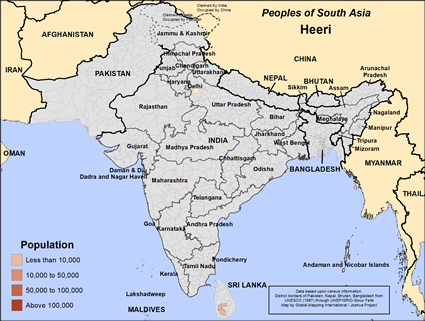Heeri in Sri Lanka

Send Joshua Project a photo
of this people group. |

Map Source:
People Group data: Omid. Map geography: UNESCO / GMI. Map Design: Joshua Project
|
| People Name: | Heeri |
| Country: | Sri Lanka |
| 10/40 Window: | Yes |
| Population: | 18,000 |
| World Population: | 18,000 |
| Primary Language: | Sinhala |
| Primary Religion: | Buddhism |
| Christian Adherents: | 1.59 % |
| Evangelicals: | 0.00 % |
| Scripture: | Complete Bible |
| Ministry Resources: | Yes |
| Jesus Film: | Yes |
| Audio Recordings: | Yes |
| People Cluster: | South Asia Buddhist |
| Affinity Bloc: | South Asian Peoples |
| Progress Level: |
|
Introduction / History
The Buddhist Heeri people, a small ethnic group in Sri Lanka, have lived in the central and southern regions of the island for centuries. Their history traces back to early Sinhalese settlers who were heavily influenced by Theravada Buddhism. Over time, the Heeri have maintained their connection to both the land and their Buddhist beliefs, playing an important role in agricultural communities. While modernization has impacted much of Sri Lanka, the Heeri people have preserved their traditional way of life.
What Are Their Lives Like?
The Heeri people primarily rely on subsistence farming, cultivating crops such as rice, vegetables and spices. Agriculture shapes their daily routines, with families working together in the fields to plant and harvest crops. Many Heeri live in small villages where the community cooperates in farming and other essential tasks. Their homes are typically simple, made from materials like mud, wood and thatch reflecting the rural environment in which they live.
Despite the simplicity of their lifestyle, the Heeri people are tightly bonded by family and social ties. Extended families often live close together, and communal work is a central aspect of village life. Though some Heeri have migrated to urban areas in search of better economic opportunities, the majority still rely on traditional farming to support their families.
What Are Their Beliefs?
The Heeri people are devout followers of Theravada Buddhism, which permeates every aspect of their lives. Their spiritual practices revolve around the teachings of the Buddha, with values such as mindfulness, compassion and non-violence guiding their behavior. Buddhist temples serve as the heart of their communities, where the Heeri gather for religious festivals, ceremonies and important life events such as weddings and funerals.
Rituals and offerings are a central part of their religious life. They observe key Buddhist festivals such as Vesak, which celebrates the birth, enlightenment and death of the Buddha. In addition, the Heeri follow the lunar calendar, participating in Poya days, which involve temple visits, meditation and acts of charity. While Buddhism remains the cornerstone of their spiritual identity, ancestral worship also plays a role, with rituals held to honor and seek blessings from their forebears.
What Are Their Needs?
The Heeri people face numerous challenges related to economic hardship and access to essential services. Many rural communities struggle with poverty, limited access to quality education, and inadequate healthcare facilities. As subsistence farmers, the Heeri are particularly vulnerable to changing climate patterns and environmental degradation, which threaten their agricultural output. Economic opportunities are limited, with few options beyond farming, leading some younger members to migrate to cities for work. Programs aimed at improving agricultural sustainability, providing better healthcare and education, and creating alternative economic opportunities would greatly benefit the Heeri people.
Prayer Points
Pray the Heeri would see they can enjoy abundant life if they put their trust in Jesus Christ.
Pray for the Lord to intervene in their families, calling people to his side and blessing them in every way.
Pray for loving workers.
Pray for their hearts to be drawn to the Lord of lords.
Pray for a church planting movement to thrive in their communities.